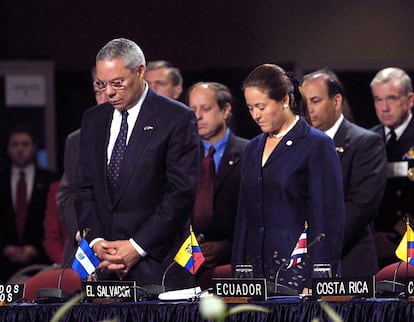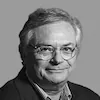What was Colin Powell doing on September 11, 2001?
In the media’s exhaustive recounting of his life, including all his successes and failures, his role championing democracy was all but forgotten

Having breakfast. In Lima, Peru.
Powell, who was the US secretary of state at the time, had accepted an invitation from Peru’s then-president, Alejandro Toledo, to a breakfast at the Presidential Palace. But Powell had not traveled to Lima just to meet Toledo. He was representing his country in what promised to be a historic meeting: on that particular September 11, 34 countries in the Americas were about to commit to strengthening and defending democracy. The document to be signed – the Inter-American Democratic Charter – enshrined the principle that “the peoples of the Americas have a right to democracy and their governments have an obligation to promote and defend it.”
Democracy was flying high at the time. In a wide range of countries, opinion polls revealed that it was broadly perceived as the best political system. It was, after all, the system that had confronted and defeated a despotic Soviet Union, ending the ruinous and inhumane communist system that the Kremlin wanted to impose on the rest of the world.
In the last 20 years the Inter-American Democratic Charter Powell signed has not been successfully invoked even when it was flagrantly violated
Before meeting the dignitaries who would sign the Democratic Charter, the former general – who at the time was perhaps the most-admired politician in the United States and regarded as a possible future president – paid a formal visit to the president of Peru. He was accompanied by five senior officials from the State Department and Toledo received them in the company of Roberto Dañino, the president of the Council of Ministers, the minister of foreign affairs, and the nation’s drug czar. None of the attendees imagined, on that promising morning of September 11, that the world would change in ways that still touch us all to this day.
As they sampled Peru’s celebrated cuisine, one of Powell’s aides handed him a note and whispered in his ear. Recalling the moment, Roberto Dañino, whom I interviewed for this piece, says that Powell read the note, frowned, and briefly informed the group that a plane had lost its way and crashed into a building in Manhattan. Talks continued until, minutes later, the aide came back and gave Powell another note. He read it, and without losing his composure, told the diners that a second plane had crashed into a building, and that everything suggested a terrorist attack was underway.
“Who is behind this?” Dañino asked. “Al Qaeda,” Powell quickly replied, but then corrected himself. “The truth is that I don’t know. But my military experience has taught me to react calmly to big events. Hopefully the dust will settle, and we will be able to see things more clearly.” They asked him if he would fly back to Washington right away, leaving one of his deputies to sign the document. “Not at all,” Powell replied. “I’ll stay and sign. Democracy is the best weapon against terrorism. The only thing I ask is that you move up the signing ceremony so I can fly back as soon as possible.”
And that’s what they did. The Democratic Charter was signed by representatives from every government in the hemisphere, except Cuba, binding the signatories to promote and protect democracy.
A lot has changed in these 20 years. A recent IPSOS survey of 19,000 people in 25 countries (including Argentina, Brazil, Chile, Colombia, Mexico and Peru) showed that many of these Latin Americans view their own country’s democracy as the worst in the world. Even more worrying is that 44% of respondents want “strong leaders willing to break the rules.” What’s more, the perception that society is fragmented is higher among Latin Americans (64%) than the rest of the world (56%).
Polarization within Latin America is inevitably reflected in the polarization of governments in the region. It is not surprising then, that in the last 20 years the Inter-American Democratic Charter Powell signed has not been successfully invoked even when it was flagrantly violated, such as by Hugo Chávez and Nicolás Maduro in Venezuela and Daniel Ortega in Nicaragua.
Colin Powell passed away on October 18 at the age of 84. In the media’s exhaustive recounting of his life, there was talk of many successes and failures. Yet his signature gracing the bottom of the Democratic Charter was all but forgotten.
I know that even in his retirement the general and diplomat was deeply concerned about the precarious state of world democracy. I wonder if Powell ever imagined that if things continued on the road they are now, that perhaps the document that he signed in Lima 20 years ago would have to be applied to the United States.
Tu suscripción se está usando en otro dispositivo
¿Quieres añadir otro usuario a tu suscripción?
Si continúas leyendo en este dispositivo, no se podrá leer en el otro.
FlechaTu suscripción se está usando en otro dispositivo y solo puedes acceder a EL PAÍS desde un dispositivo a la vez.
Si quieres compartir tu cuenta, cambia tu suscripción a la modalidad Premium, así podrás añadir otro usuario. Cada uno accederá con su propia cuenta de email, lo que os permitirá personalizar vuestra experiencia en EL PAÍS.
¿Tienes una suscripción de empresa? Accede aquí para contratar más cuentas.
En el caso de no saber quién está usando tu cuenta, te recomendamos cambiar tu contraseña aquí.
Si decides continuar compartiendo tu cuenta, este mensaje se mostrará en tu dispositivo y en el de la otra persona que está usando tu cuenta de forma indefinida, afectando a tu experiencia de lectura. Puedes consultar aquí los términos y condiciones de la suscripción digital.









































